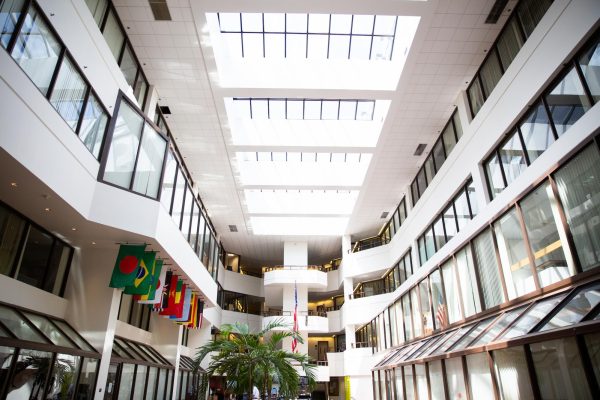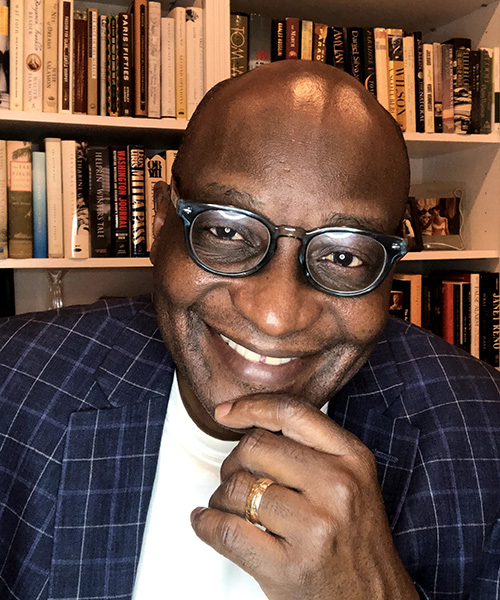A former Israeli security official analyzed the possible impacts of President Donald Trump’s approach to diplomacy in the Middle East during a Georgetown University webinar March 12.
Chuck Freilich, a former deputy national security advisor in Israel who will join Georgetown’s Center for Jewish Civilization (CJC) as a visiting professor for the 2025-26 academic year, was the webinar’s featured speaker. The event — titled “Trump, the Mideast and US-Israeli Relations: Game Changer or Agent of Chaos?” — allowed students to hear from Freilich and CJC Director Jonathan Lincoln.

Freilich said Trump has been a consistent ally of Israel throughout the latest Israel-Hamas war, but added that Trump’s recent tense interactions with Ukrainian leaders are potentially concerning for Israel.
“What I’m very worried about — yes, Trump was and so far has been very virtuous and some people may say too good, but could Trump turn on a dime against Israel?” Freilich said during the event.
Trump supported Israel during his first presidential term and in the aftermath of the Oct. 7, 2023 attack during which Hamas militants crossed into Israel, killed almost 1,200 Israelis and took 251 hostages. After the attack, the Israeli military invaded Gaza and has since killed over 40,000 Palestinians. The United States helped broker a preliminary ceasefire agreement effective Jan. 19 — which both Trump and former President Joe Biden claimed credit for — which included the return of Israeli hostages in exchange for the release of around 1,900 Palestinian prisoners.
Freilich said both the ceasefire deal and Trump’s rhetoric ahead of his inauguration showed that Trump’s tactics may lead to successful diplomacy in the region.
“He started even before entering office, literally days leading up to Jan. 20, with the success that he threatened that there would be all hell to pay,” Freilich said. “But it led to that hostage deal, which has gotten a lot of people back home — that was a good thing.”
Freilich added that Trump’s proposal to forcibly relocate Palestinians out of Gaza to build a “Riviera of the Middle East” is ill-conceived.
“He also came up with this idea of relocating, forcing out, whatever you want to call it, over 2 million Palestinians from Gaza,” Freilich said. “It’s a proposal which was dead on arrival, and I don’t think an American president should be coming out with a proposal that you know has absolutely no chance of going ahead.”
“If I have difficulty still in understanding Israeli decision making, then understanding the Trumpian chaotic approach is an even bigger challenge,” Freilich added.
Freilich said Trump’s first term is instructive for analysts hoping to understand how Trump will engage with the current conflict. During his first term, Trump’s administration brokered the Abraham Accords, a series of peace agreements signed in 2020 which aimed to normalize diplomatic relations between Israel and Morocco, Bahrain and the United Arab Emirates.
“You have to step back for a minute and talk about his first term, which in many ways was very, very good for Israel,” Freilich said. “He brought us the Abraham Accords — the peace agreements with the Emirates, with Bahrain and with Morocco.”
However, Freilich said, Trump’s record in the Middle East is mixed, noting that his withdrawal from the Joint Comprehensive Plan of Action (JCPOA) — a multinational agreement signed in 2015 that aimed to prevent Iran from developing nuclear weapons — gave Iran more power.
“He also withdrew from the Iran Nuclear Deal, the JCPOA, which I think was a catastrophic mistake and the reason that today, that Iran has become a nuclear threshold state and can cross it at any moment,” Freilich said.
Lincoln, who moderated the event, said Freilich has been an important influence for him since early in his career, when he first read Freilich’s writings on Israeli politics.
“The article on national security decision making really was a revelatory moment for me,” Lincoln said at the event. “Dr. Freilich has really managed to distinguish himself by being the first to analyze Israel’s decision-making process in the security sphere.”
Freilich said Trump’s unorthodox methods have encouraged diplomats to rethink their approach to peace in the Middle East despite personal disagreement with some of Trump’s decisions.
“When you’re a disruptor, you can cause real destruction,” Freilich said. “You can also sometimes force people to think about it differently.”
“What he’s doing here is he’s forced the Arab world and others to start taking a different look at Gaza, and I think that is good,” Freilich added.







